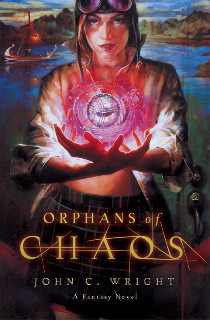John C. Wright, Orphans of Chaos
reviewed by Danielle L. Parker

|
|
Orphans of Chaos
Author: John C. WrightPublisher: Tor, 2005 Hardcover: $24.95 U.S. Length: 317 pages ISBN: 0-765-31131-3 |
Once in a while, even one’s dearly beloved has an off night in one’s affections. Maybe he forgot to brush his teeth, and the effluence of his breath does not add to the aroma of the morning coffee; or it’s that unfortunate habit he has of chatting up his chance-met former girlfriends, while you stand by like the old familiar dog on the doormat, too taken-for-granted to merit an introduction (or better yet, a snub of The Ex). Whatever it is, there’s no doubt that some days even one’s Nearest and Dearest doesn’t quite come up to expectations.
I couldn’t figure out at first just why John C. Wright’s latest series, Orphans of Chaos, left me turning the pages hungrily (as I would do for any John C. Wright novel), but slightly less satisfied than usual by the end. What was missing?
Well, we do have glorious adventure, which goes without saying with this author. I’ve come to the conclusion, after the Golden Age trilogy and Guardians, that few authors do cosmic adventure with quite the zest of Mr. Wright. In an interview that can be read on the Internet, Mr. Wright quotes his own love of the Golden Age writers A. E. van Vogt and Roger Zelazny. Certainly, there are similarities, in both the zestful sense of fun and adventure of Zelazny’s works and in the wow-what’s-going-on awe evoked by the van Vogt Superman stories (during their time, at least).
But the best works of John C. Wright exceed those authors in other ways. The Last Guardians of Everness, for example, examines the dilemma of Prometheus vs. the gods... the question of humanity’s right to self-determination vs. blind obedience to Heaven’s decrees: that Free Will thing, in fact. True, there are a number of semi-religious discussions in Orphans of Chaos, some of which, frankly, go on a bit too long; I turned a page over one lengthy soliloquy. But still, there’s just that extra philosophic element missing in this one. The beloved had just a slightly off night.
But don’t wait to go out and read the story, all the same. Perhaps to compensate for the lack of that extra philosophic (usually humanist) element that we normally see in a John C. Wright story, we get an extra dose of suspense. In Orphans of Chaos, we have five teenagers (barely post-pubescent) who seem to have spent their mysterious lives penned up in a school for orphans. There’s just the five of them, a great vast estate and strange boundaries and just slightly peculiar personages to tend to their every need. Why have they been separated from other children all their lives? Why are they locked up at night, and what is the purpose of the strange medicines Dr. Fell prescribes them every night? How can young Victor open locks with only his mind, and little Quentin fly? Are the children themselves more than human... and why do they keep forgetting things?
The protagonist of the story is young Amelia, who is a spunky, smart young heroine most of the time, when she isn’t panting at the idea of a spanking or bondage. There’s a bit of mild public-school style naughtiness in here, including a bottom-whacking by a muscular and decidedly hunky schoolmaster. I didn’t mind that all that much, (he is a hunk), but I’d have liked the heroine better if she’d had a little more moral fortitude. Given the choice between getting more of a spanking and giving in and groveling, she gives in and grovels good and proper, which is really pretty weak of her, since spanking seems to turn her on. Goodness, Mr. Wright, let’s at least make her a pushy bottom.
We also have Wright’s now-maybe-too-familiar combination of Greek and semi-Christian mythos. I think this worked better for me in Guardians, in terms of awe and mystery, but Orphans of Chaos does it with a wonderful sense of fun. The Goddess of Love is a giddy and vain bubblehead whose beauty seems to have rotted out her brains; the Prince of Lies, the Trickster, otherwise known as Hermes, is depicted clad in bright green Lycra bicycle tights and world-wearied cynicism. The reader will enjoy working out just which myth is represented by the larger-than-life but often all-too-tawdry figures that pass on Wright’s colorful stage.
But don’t take the religious gloss — pagan or Christian — too seriously here: we’re not talking Gene Wolfe, who truly is, first and foremost, a serious religious writer, to my mind. Wright’s universes are more like glimpses of Fairyland: wonderful adventures and evocative descriptions and magic and awe, right over the familiar horizon.
Orphans of Chaos, though not as great a work as Wright’s earlier stories, is a lively read. It’s got its own sense of slightly naughty fun, as if Wright set out this time to surprise his fans with his tongue in his cheek. Check it out!
Copyright © 2006 by Danielle L. Parker

